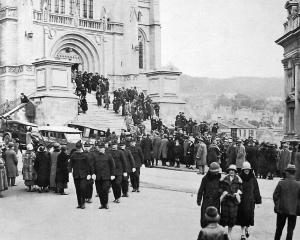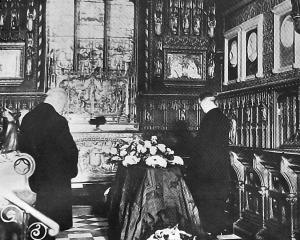
The imaginative author of "She" and "King Solomon’s Mines" is more keenly appreciative than most men of the glamour surrounding the pursuit of exploratory quests.
But (apparently with some remorseful recollection of early indiscretion of his own) he pleads for due recognition of the sacred and inalienable rights of the dead.
He stigmatises as "indecent and unholy" the idea of exposing "the mummies of great kings in a glass case in Cairo Museum to rot and become the merry jest of tourists."
He pertinently lays stress on the ancient Egyptian horror of tomb-desecration — the reasonable inference being that the lapse of ages does not weaken the obligation of reverent treatment imposed upon the modern world.
Materialistic cynics may sneer that it can make little difference to Tutankhamun whether his remains are treated with sacrilegious carelessness or with the reverence dictated by historical imagination and humane decency.
Literally true, no doubt, but spiritually false, is this light saying; and at any rate the settlement of the question may make some difference to modern self-respect.
Not as a museum exhibit, casually canvassed by inquisitive globe-trotters, but in the seclusion of secular inscrutability, should King Tutankhamun find his last resting-place.
— editorial
Putting Dunedin on the map
If the measure of interest and enthusiasm respecting the proposal for an Imperial Exhibition in Dunedin in 1925 may be correctly gauged from the meeting of citizens in the Town Hall on Thursday evening the prospects of success should be promising.
An exhibition of substantial dimensions would undoubtedly be of national, provincial and civic benefit, and there are strong reasons in favour of the proposal.
If the project is carried through on the lines suggested it will presumably be comparable to the New Zealand and South Seas Exhibition of 1889-1890, which did much for Dunedin and not a little for the colony.
Otira Gorge plunge
A motor car, with seven passengers aboard, ran off the Otira Gorge road at Hairpin Bend on the zig-zag on Thursday afternoon and a fall of 80 feet was broken by willows.
There were some wonderful escapes. One lady grasped a tree, hanging suspended until lifted down. The only person hurt was Constable Baird, who injured his chest.
Double standard
At the executive meeting of the Women’s Christian Temperance Union, attention was called to the arrest of the unfortunate women found in a stable in Maclaggan St.
While agreeing with the statement that the said women are a menace to the community, members of the union considered their names should have been withheld from the columns of the press unless the names of the men consorting with them were published. — ODT, 17.2.1923
Compiled by Peter Dowden











